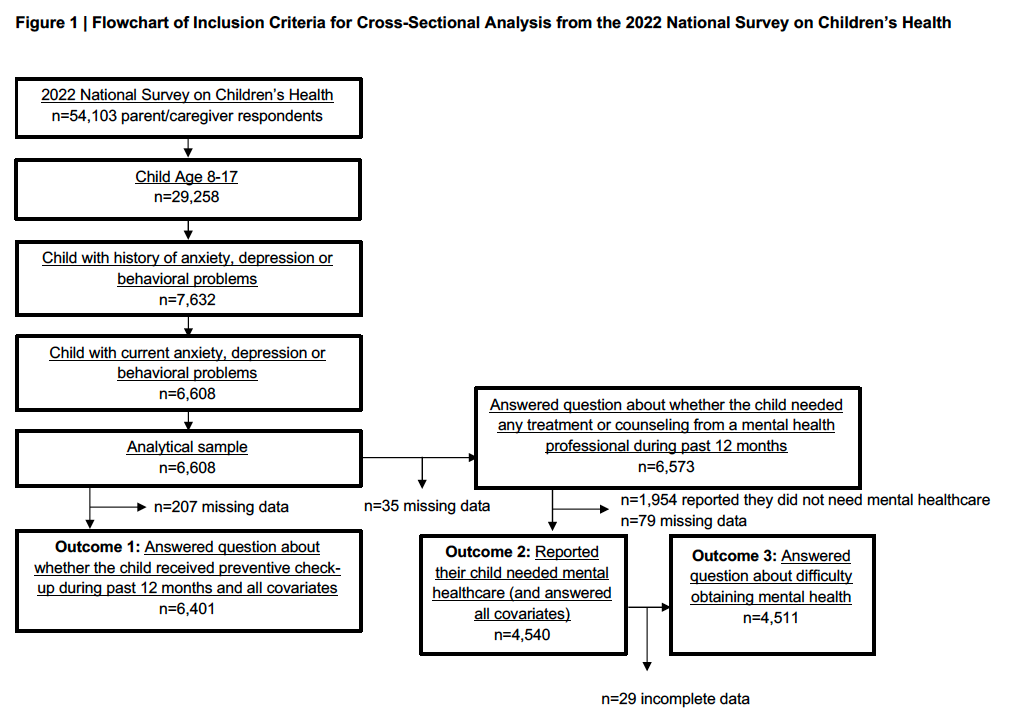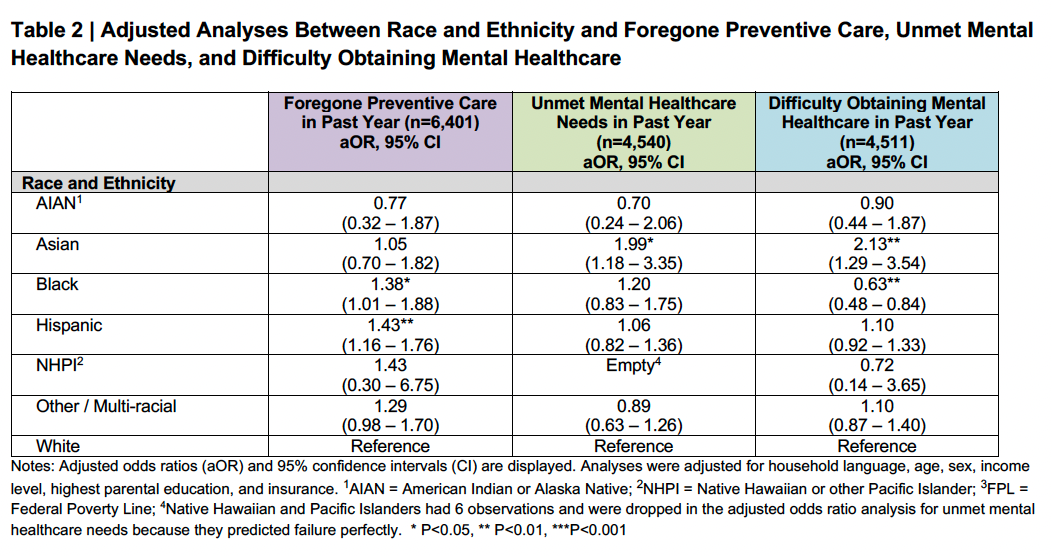Mental Health 3
Session: Mental Health 3
083 - Racial and Ethnic Disparities Across Foregone Preventive Care and Unmet Mental Healthcare Needs Among Children and Adolescents with Common Mental Health Problems
Monday, April 28, 2025
7:00am - 9:15am HST
Publication Number: 83.6328
Anthony L. Bui, University of Washington/Seattle Children's, Seattle, WA, United States; Alexis Ball, Seattle Children's, North Bend, WA, United States; Marie Ng, University of Washington School of Medicine, Singapore, N/A, Singapore; Frederick Rivara, Univ, Seattle, WA, United States; Tumaini Rucker. Coker, University of Washington School of Medicine, Seattle, WA, United States

Anthony L. Bui, MD, MPH (he/him/his)
Acting Assistant Professor of Pediatrics
University of Washington/Seattle Children's
Seattle, Washington, United States
Presenting Author(s)
Background: To address the growing youth mental health crisis, collaborative care models for behavioral health rely on both routine preventive care and referral for mental healthcare to increase access to care.
Objective: To examine racial and ethnic disparities of foregone preventive care and unmet mental healthcare needs among a national sample of pre-, early, and middle adolescent youth with common mental health problems.
Design/Methods: We conducted a cross-sectional analysis using the 2022 National Survey of Children’s Health. We analyzed children aged 8-17 with parent-reported current anxiety, depression, or behavioral problems. We analyzed questions related to receiving preventive care, receiving counseling from a mental health professional if parents reported mental healthcare need, and difficulty obtaining mental healthcare. We employed logistic regressions to estimate odds ratios for each racial and ethnic group compared to White children, the largest group, as the reference, and adjusted for age, sex, language, income, parental education, and insurance.
Results: Our analysis included 6,608 children with common mental health problems (Figure 1). Racial and ethnic composition of the sample is listed in Table 1. 849 (13.3%) children with common mental health problems had forgone preventive care, while 636 (14.0%) had unmet mental healthcare needs and 2,755 (61.1%) reported difficulty obtaining mental healthcare. Adjusted analyses showed that Black and Hispanic children had 1.38 [95% CI, 1.01-1.88] and 1.43 [1.16-1.76] times the odds of foregoing preventive care compared with White children (Table 2). Compared to White children, Asian children had 1.99 [1.18-3.35] and 2.13 [1.29-3.54] times the odds of having unmet mental healthcare and difficulty obtaining mental healthcare, respectively, while Black children had 0.63 [0.48-0.84] times the odds of difficulty obtaining care.
Conclusion(s): Racial and ethnic disparities exist in accessing preventive and mental healthcare among children with parent-reported mental illness and mental healthcare needs. We found that Asian youth have the greatest unmet mental healthcare needs and difficulty accessing care compared to other groups. Limitations include sampling and self-reporting biases. Under-diagnosis of mental illness, due to stigma, distrust, and institutional racism, may underestimate disparities. Further research should explore barriers and facilitators of effective collaborative care to reduce mental healthcare disparities.
Figure 1 | Flowchart of Inclusion Criteria for Cross-Sectional Analysis from the 2022 National Survey on Children’s Health

Table 1 | Demographic Characteristics of Overall Study Sample of Children with Mental Health Problems and Primary Outcomes (Foregone Preventive Care, Unmet Mental Healthcare Needs, and Difficulty Obtaining Mental Healthcare)
.png) Notes: 1AIAN = American Indian or Alaska Native; 2NHPI = Native Hawaiian or other Pacific Islander; 3FPL = Federal Poverty Line
Notes: 1AIAN = American Indian or Alaska Native; 2NHPI = Native Hawaiian or other Pacific Islander; 3FPL = Federal Poverty LineTable 2 | Adjusted Analyses Between Race and Ethnicity and Foregone Preventive Care, Unmet Mental Healthcare Needs, and Difficulty Obtaining Mental Healthcare
 Notes: Adjusted odds ratios (aOR) and 95% confidence intervals (CI) are displayed. Analyses were adjusted for household language, age, sex, income level, highest parental education, and insurance. 1AIAN = American Indian or Alaska Native; 2NHPI = Native Hawaiian or other Pacific Islander; 3FPL = Federal Poverty Line; 4Native Hawaiian and Pacific Islanders had 6 observations and were dropped in the adjusted odds ratio analysis for unmet mental healthcare needs because they predicted failure perfectly. * P<0.05, ** P<0.01, ***P <0.001
Notes: Adjusted odds ratios (aOR) and 95% confidence intervals (CI) are displayed. Analyses were adjusted for household language, age, sex, income level, highest parental education, and insurance. 1AIAN = American Indian or Alaska Native; 2NHPI = Native Hawaiian or other Pacific Islander; 3FPL = Federal Poverty Line; 4Native Hawaiian and Pacific Islanders had 6 observations and were dropped in the adjusted odds ratio analysis for unmet mental healthcare needs because they predicted failure perfectly. * P<0.05, ** P<0.01, ***P <0.001
